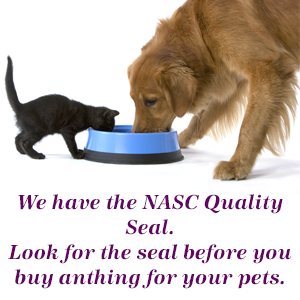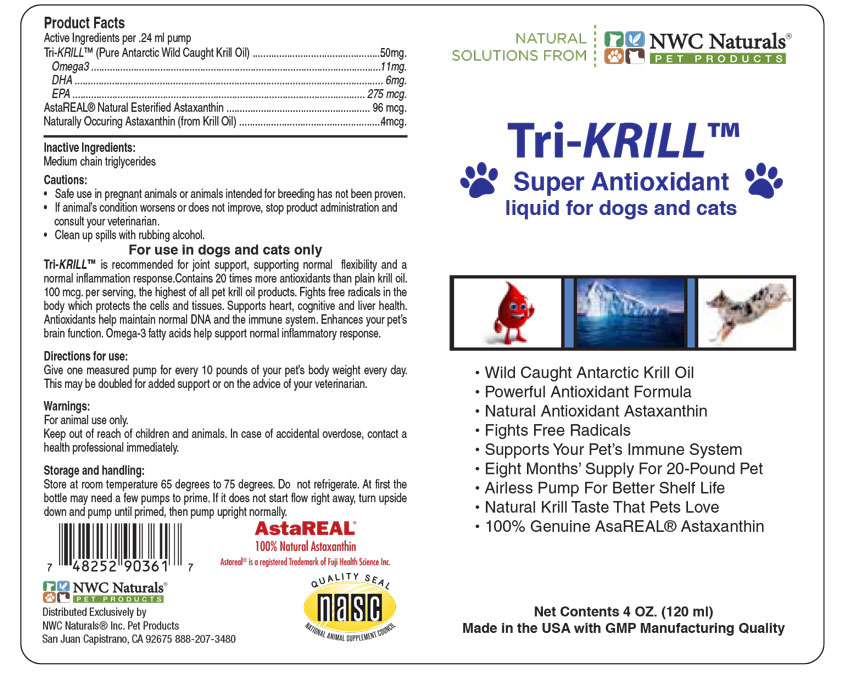Tri-KRILL™ For Pets Pump - Buy 3 Get 1 FREE!
Best Value
Tri-KRILL ™ Pump For Pets: Buy 3 Get 1 FREE Discount Pack
 Powerful Antioxidant Formula
Powerful Antioxidant Formula  Supports Your Pet’s Immune System
Supports Your Pet’s Immune System Easy to use pump with no fishy breath
Easy to use pump with no fishy breath Recommended for joint support, supporting normal flexibility
Recommended for joint support, supporting normal flexibility
NOTE: To prime the vacuum pump, just pump it 2-3 times. If it does not prime turn upside and pump 2-3 times and then operate upright as usual.
Details

Tri- KRILL™ Pump For Pets contains 500 pumps per bottle. Use one pump for every 10 pounds of body weight per day, thats a 250 Day supply for a 20 pound pet.
Tri- KRILL™ contains more astaxanthin per serving than any other plain krill oil product on the market.
Tri-KRILL™ is sourced directly from the Antarctic which combines the power of Krill Phospholipids with 7X astaxanthin per serving in an easy-to-use pump.We add genuine AstaREAL® astaxanthin to enhance the naturally occurring astaxanthin that krill oil contains twenty times stronger, the highest level in any krill pump.
- Wild Caught Antarctic Krill Oil

- Powerful Antioxidant Formula
- Natural Antioxidant Astaxanthin
- Fights Free Radicals
- Supports Your Pet’s Immune System
- Eight Months’ Supply For 20-Pound Pet
- Airless Pump For Better Shelf Life
- Natural Krill Taste That Pets Love
- 100% Genuine AsaREAL® Astaxanthin
Benefits of Astaxanthin: Physical Endurance and Muscle Recovery
Physical Endurance and Muscle Recovery Supports Good Eye Function
Supports Good Eye Function Supports Good Skin Health
Supports Good Skin Health Immune Response
Immune Response
Benefits of Tri-Krill™: Healthy immune system and joint support
Healthy immune system and joint support Krill oil contains Choline which is found in krill phospholipids as part of the Phosphatidyl choline molecule. Choline is not found in fish triglycerides. Choline has critical functions as a precursor to the neurotransmitter acetylcholine.
Krill oil contains Choline which is found in krill phospholipids as part of the Phosphatidyl choline molecule. Choline is not found in fish triglycerides. Choline has critical functions as a precursor to the neurotransmitter acetylcholine.
Why is it so important to supplement my pet’s diet with Omega 3 fatty acids?
Today, our pets are receiving more Omega 6 fatty acids in their diets than necessary. The cattle meat used in most pet foods contains an unnecessary amount of Omega 6 fatty acids because the cattle are now being fed grains instead of grass.
Too many Omega 6 fatty acids can cause many problems in your pets. Supplementing our pets’ diets with Omega 3 fatty acids will help to normalize this imbalance.
Krill Oil absorbs quickly into the system, providing benefits such as agility, suporint healhty joints and can help maintain a healthy heart, brain and nervous system, skin and coat.
How does fish oil compare to krill oil?
 Krill oil contains a higher concentration of Omega 3 fatty acids, and also contains Astaxanthin, which is an added nutritional benefit.
Krill oil contains a higher concentration of Omega 3 fatty acids, and also contains Astaxanthin, which is an added nutritional benefit.
 It does not contain mercury and therefore there is no added risk of heavy metal poisoning.
It does not contain mercury and therefore there is no added risk of heavy metal poisoning.
 In addition, Krill Oil contains highly bioavailable EPA and DHA which can aid in cognitive function, and support healthy joints.
In addition, Krill Oil contains highly bioavailable EPA and DHA which can aid in cognitive function, and support healthy joints.
 Krill Oil is FOUR times more potent than Fish Oil and therefore has four times the benefit!
Krill Oil is FOUR times more potent than Fish Oil and therefore has four times the benefit!
 Because of the Astaxanthin in krill oil; this puts it to the top of the list of all omega-3 fatty acids sources.
Because of the Astaxanthin in krill oil; this puts it to the top of the list of all omega-3 fatty acids sources.
What Is Astaxanthin?
Krill oil contains high levels of one of the most powerful natural antioxidants called Astaxanthin. Astaxanthin is a carotenoid molecule from the same family as beta-carotene, lycopene, and zeaxanthin, though astaxanthin appears to be more active in quenching superoxide, hydroxyl, and other radical species.
Astaxanthins is what gives salmon its red color. Krill get their astaxanthin from small phytoplankton, their primary source of food. While krill contain natural levels of astaxanthin, we provide additional astaxanthin to our omega-3 krill phospholipid products.
Krill oil contains omega-3 fatty acids, which is the main reason it's a popular nutritional supplement.
Krill oil is contains an antioxidant called astaxanthin. The algae that krill eat produce the bright red pigment astaxanthin that gives krill and other crustaceans such as lobster and shrimp their reddish-pink color.
Unlike fish oil, krill oil doesn't cause fishy breath. Also, krill oil contains higher amounts of astaxanthin than fish oil.
Storage and handling:
Store at room temperature 65 degrees to 75 degrees. Do not refrigerate. At first the
bottle may need a few pumps to prime. If it does not start flow right away, turn upside
down and pump until primed, then pump upright normally.
Side Effects; Pets with allergies to seafood shouldn't use krill oil.
More Information
What Is Astaxanthin?
Tri-Krill™ contains high levels of one of the most powerful natural antioxidants called Astaxanthin. Astaxanthin is a carotenoid molecule from the same family as beta-carotene, lycopene, and zeaxanthin, though astaxanthin appears to be more active in quenching superoxide, hydroxyl, and other radical species.
Astaxanthins is what gives salmon its red color. Krill get their astaxanthin from small phytoplankton, their primary source of food. While krill contain natural levels of astaxanthin, we provide additional astaxanthin to our omega-3 krill phospholipid products.
What are Krill and where do they come from?
Krill is the common name given to the Euphausiacea of shrimp-like marine crustaceans. Also known as euphausiids, these small invertebrates are found in all oceans of the world. The common name Krill comes from the Norwegian word krill, meaning "young fry of fish", which is also often attributed to other species of fish. Krill are found in all oceans of the world but harvested from the Antarctic waters and Southern Oceans.
These small crustaceans fuel the oceans of the world. Krill feed on phytoplankton, microscopic, single-celled plants that drift near the ocean’s surface and live off carbon dioxide and the sun’s rays. They feed hundreds of animals from fish, birds and whales. Antarctic krill are among the largest of the 85 known krill speciesand can live up to 10 years.
Krill oil contains omega-3 fatty acids, which is the main reason it's a popular nutritional supplement.
Krill oil is contains an antioxidant called astaxanthin. The algae that krill eat produce the bright red pigment astaxanthin that gives krill and other crustaceans such as lobster and shrimp their reddish-pink color.
Unlike fish oil, krill oil doesn't cause fishy burps or an after taste. Also, krill oil contains higher amounts of astaxanthin than fish oil.
Directions
Directions:
Give one measured pump for every 10 pounds of your pet’s body weight every day. This may be doubled for added support or on the advice of your veterinarian.
Side Effects:
Pets with allergies to seafood shouldn't use krill oil.
Read our label
FAQ
What is so special about Tri- KRILL ™?
Tri- KRILL ™ oil contains no less than 42% Phospholipids and 20 X the Astaxanthin, higher than any regular krill oil product on the market. Every batch is tested for contaminants and heavy metals. We feel we have set the highest standards for quality in our krill oil. It is also independently tested with 3rd party testing.
How is Tri- KRILL ™ Oil manufactured?
Our Tri- KRILL ™ Oil is manufactured at a state of the art manufacturing facility that has been working with nutritional lipids for over 12 years. This facility is recognized worldwide for its standards and the quality of lipids they produce.
How is the Krill Oil harvested?
Each trawler is allowed to harvest during the main season and only about 1% of the allowable limit is actually harvested. Krill harvesting is among the most regulated of any harvesting or fishing methods in the oceans.
Is the krill population in the oceans sustainable?
Our krill is made from Euphausia superb (Antarctic Krill). This is one of the earth's most abundant and sustainable organisms. Antarctic krill is the largest biomass on earth. The total quantity is estimated to be between 500 and 800 million tons. The weight of this biomass is almost double that of all the humans on earth.
The krill harvest is well below conservative international catch guidelines. Most of the harvested krill is used for fish feed in salmon farms and the quantities harvested are less than 1% of the 1% harvested annually.
What Is Astaxanthin?
Krill oil contains high levels of one of the most powerful natural antioxidants called Astaxanthin. Astaxanthin is a carotenoid molecule from the same family as beta-carotene, lycopene, and zeaxanthin, though astaxanthin appears to be more active in quenching superoxide, hydroxyl, and other radical species.
Astaxanthins are what gives salmon its red color. Krill get their astaxanthin from small phytoplankton, their primary source of food.
While krill contain natural levels of astaxanthin, we enrich our Tri- KRILL ™ with additional astaxanthin to 7 times the regular level. This is in recognition of the tremendous antioxidant value astaxanthin adds to both product stability and clinical outcomes.
Can pets take Krill Oil if they are allergic to shellfish?
It is not recomended. Talk with your veterinarian if you suspect your pet is allergic to shellfish or fish. Some krill oil blends also contain some fish oil as a carrier, and fish can end up in the krill biomass as a by-catch. So, if your pet is allergic to fish do not give him/her this product.
Have there been any studies on pets supplementing with Krill Oil?
Studies have been conducted , revealing that arthritis improved 47% in mice supplementing with Krill Oil as opposed to the 26% improvement when supplementing with Fish Oil.
Why is it so important to supplement my pet’s diet with Omega 3 fatty acids?
Today, our pets are receiving more Omega 6 fatty acids in their diets than necessary. The cattle meat used in most pet foods contains an unnecessary amount of Omega 6 fatty acids because the cattle are now being fed grains instead of grass. Too many Omega 6 fatty acids can cause many problems in our pets. Supplementing our pets’ diets with Omega 3 fatty acids will help to normalize this imbalance. Krill Oil absorbs quickly into the system, providing benefits such as agility and can help maintain a healthy heart, brain and nervous system. Ask your veterinarian about how Krill Oil can benefit your pet!
Isn’t fish oil a good source of Omega 3 fatty acids too?
Yes. However, Krill oil contains a higher concentration of Omega 3 fatty acids, and also contains Astaxanthin, which is an added nutritional benefit. It does not contain mercury and therefore there is no added risk of heavy metal poisoning. In addition, Krill Oil contains highly bioavailable EPA and DHA which can aid in your pets health. Krill Oil is FOUR times more potent than Fish Oil and therefore has four times the benefit!


